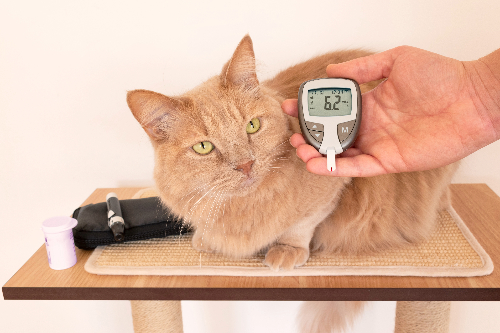Pet Diabetes: What You Should Know

Pet health is a vital concern for loving pet owners. In our journey to ensure our beloved pets live happy, healthy lives, it’s crucial to be informed about common health issues they may face. One such condition is diabetes, a disease that can affect both dogs and cats. This blog, brought to you by Happy Tails Emergency Veterinary Clinic in Greensboro, North Carolina, aims to shed light on pet diabetes and its implications for pet health.
What is Pet Diabetes?
Diabetes in pets, similar to humans, is a condition where the body cannot properly process glucose. This leads to elevated blood sugar levels, which can cause a range of health issues. There are two types of diabetes in pets: Type 1, where the body doesn’t produce enough insulin, and Type 2, where the body can’t use insulin effectively.
Symptoms of Pet Diabetes
Early recognition of diabetes symptoms is key. Look out for increased thirst, frequent urination, weight loss despite normal or increased appetite, lethargy, and a dull coat. If you observe any of these signs in your pet, it’s crucial to contact Happy Tails Emergency Veterinary Clinic at (336) 288-2688 for a professional assessment.
Diagnosing Pet Diabetes
Diagnosis typically involves a thorough examination, including blood tests and urine analysis. These tests can confirm high glucose levels and help rule out other conditions.
Managing Pet Diabetes
While there’s no cure for diabetes, effective management can help your pet lead a relatively normal life. Treatment often includes insulin injections, dietary changes, and regular exercise. Your veterinarian will provide detailed guidance tailored to your pet’s needs.
The Role of Diet and Exercise in Managing Pet Diabetes
A healthy diet and regular exercise are crucial in managing pet diabetes. A diet low in carbohydrates and high in fiber is often recommended. Regular exercise helps maintain a healthy weight and regulate blood sugar levels.
Monitoring Your Pet’s Condition
Regular monitoring is essential in managing pet diabetes. This includes keeping track of your pet’s blood sugar levels, monitoring their weight, and watching for any changes in their behavior or appetite. Regular check-ups with your primary veterinarian are also key to ensuring your pet’s treatment plan is effective.
The Importance of Veterinary Care
Professional veterinary care is paramount in managing pet diabetes. Your veterinarian will not only provide the initial diagnosis and treatment plan but also offer ongoing support and adjustments to treatment as needed. Remember, early intervention can make a significant difference in your pet’s health and quality of life.
It is also important to be aware of the signs of DKA, or Diabetic Ketoacidosis. DKA can be fatal if not addressed in a timely manner. Warning signs include vomiting, diarrhea, disorientation, depression, lethargy, and in more serious cases, coma. Treatment for Diabetic Ketoacidosis can include hospitalization, electrolyte monitoring, blood and glucose monitoring, intravenous fluids for dehydration and electrolyte imbalances, short-acting insulin injections, anti-nausea medications, and gastroprotectant medications.
Partnering with Your Veterinarian for Your Pet’s Health
Understanding pet diabetes is the first step in ensuring your furry companion lives a long, healthy life. Regular veterinary check-ups, a proper diet, exercise, and vigilant monitoring are essential. If you suspect your pet is having a diabetic emergency, call Happy Tails Emergency Veterinary Clinic at (336) 288-2688 today. Our team is dedicated to providing comprehensive care and support for your pet’s needs.
Recent Posts
About Us
At Happy Tails Veterinary Emergency Clinic in Greensboro, NC, our kind and knowledgeable team is available to provide gold standard emergency vet care for you and your pet. We’re available in the late night and early morning hours during the week, and 24/7 on weekends for your convenience.
